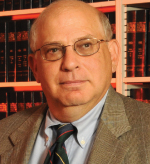Forged in Steel

The size of attorney Richard Brean's client list is double the population of Pittsburgh, Pennsylvania. As general counsel of the largest industrial union in North America, Brean '70 represents the 670,000 members of the United Steelworkers. When USW International President Leo Gerard appointed him to the position early this year, Brean became just the eighth general counsel in the union's sixty-six-year history, succeeding luminaries such as former Supreme Court Justice and Secretary of Labor Arthur Goldberg. "The Steelworkers' legal department is one of the best in-house operations in the labor movement," Brean said. "I hope to be worthy of the people who preceded me."
The promotion culminates Brean's thirty-year career at the USW, where he previously served as senior associate general counsel. "His work has been crucial to our winning contract settlements in some of our biggest disputes over the past decade," Gerard said. Brean's pursuit of unfair labor-practice cases before the National Labor Relations Board saved more than five thousand jobs of USW members who were unlawfully locked out or permanently replaced after striking plants in the Midwest and South. "Getting those jobs back was a great feeling," Brean said. "I love labor law because I am able to live my ideals."
Those ideals are rooted in his experience at Kenyon, where the student counterculture in the late sixties shaped Brean's social conscience. "You couldn't have graduated in 1970 from Kenyon without having a shared concern for people," he said. "I firmly believe that people who were not on a college campus then have a different perspective today on the world."
Brean majored in history and had planned to become a professor. "But in my senior year, with our cities on fire, teaching history suddenly didn't seem relevant, so I decided to apply to urban affairs school," he said. He earned a master's degree in public affairs and urban planning from Princeton University in 1973, before Watergate turned his attention to law. He then went to Harvard Law School, where he "totally became turned on to labor law," and joined the USW immediately after receiving his J.D. in 1978.
In his position as the union's chief legal officer, Brean supervises a staff of sixteen attorneys and the work of more than fifty outside firms. He deals with a broad range of industries ranging from metals to pharmaceuticals. "We attract idealistic people for whom working here is a dream," he said. USW lawyers are on the front lines of the labor movement, fighting on behalf of membership against anti-union employers and policymakers. "The most pressing issues we face today are the illegal obstacles to organizing," he said. "Worker activists involved in an organizing campaign have a 20 percent chance of being fired and 58 percent of American workers believe they will be fired if they try to start a union."
He criticizes free-trade policies for "wiping out millions of American jobs" and the cost of a healthcare system that "is killing U.S. employers and making them globally non-competitive." The USW, he noted, represents more than 250,000 Canadian workers and "our members unanimously support the Canadian system of universal coverage."
Brean bristled at the notion that unions have outlived their purpose. "There are forty-two million Americans without health insurance and not one of them is a USW member," he said. "Fifty-three percent of Americans don't have a retirement plan, but every member of the steelworkers has one. So you tell me if we're still necessary." He has little patience for the charge that union wages have driven up the cost of consumer goods and undermined performance incentives. "Union workplaces have to be more productive to survive precisely because they pay more money," he said. "Wage gains lift our entire society."
Brean grew up in Pittsburgh, the headquarters of the USW, where he still resides with his wife, Karen. Their daughter, Molly, is a freshman at Princeton. He is the son of a pharmacist with union members on both sides of his family. "We weren't poor, but I can tell you we had no money to go to college," he said. "Kenyon came through with a fantastic scholarship offer that allowed me to go to college. I owe everything to Kenyon."
- Dennis Fiely

 Delicious
Delicious Facebook
Facebook StumbleUpon
StumbleUpon Digg
Digg reddit
reddit